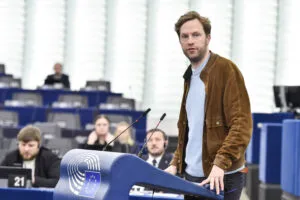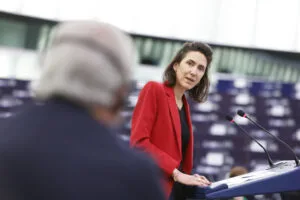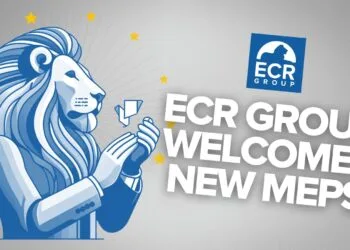Brussels – One of Renew Europe’s last high hopes for rising to third place among the groups in the EU Parliament lay with Volt’s five newly elected MEPs. However, hopes were dashed this morning (June 24) when the pan-European party announced in a press conference which group its members would join in the 10th parliamentary term. “I am happy that Volt’s members followed our recommendation for Green/ALE because the group supported our mission to act on EU reforms, humane migration rules, a competitive economy, transition to climate neutrality, and social justice,” Volt’s co-founder (and re-elected to the EU Parliament), Damian Boeselager, explained to reporters.

After two weeks of negotiations, the three German MEPs (in addition to Boeselager, also Nela Riehl and Kai Tegethoff) and the two Dutch MEPs (Anna Strolenberg and Reinier van Lanschot) elected from the ranks of Volt suggested to the party’s electoral base last week to continue with the alliance forged in the EU Parliament during the last legislative term, putting the decision to a vote of members across the continent. “Volt aims to have its own group in the EU Parliament in order to become a truly European party,” Boeselager pointed out, stressing that “until then, we ask our members to decide where to sit.” As disclosed by the party’s leaders, 87 percent confirmed the Green/ALE group, rejecting instead the proposal from Renew Europe liberals of swelling their ranks: “The fight against right-wing populists is at the heart of Volt’s agenda. the Greens/ALE are among the most credible groups in countering them,” explained Dutchman Strolenberg, echoed by colleague van Lanschot: “The VVD [People’s Party for Freedom and Democracy, ed.] has not received sanctions that we consider sufficient.”
The reference is to the Dutch Liberal Party, which gave the green light to a government with the far-right, anti-immigrant, anti-Islamic, and strongly Euroskeptic PVV (Party for Freedom), even though in early May the leaders of Renew Europe, the Progressive Alliance of Socialists and Democrats (S&D), the Greens/ALE and the Left had signed a joint statement in which they pledged not to enter into coalitions with the far-right “at any level.” The European Liberals promised to put the issue on the agenda just after the European elections. However, the meltdown at the polls in the 27 EU member states between June 6 and 9 put the brakes on the internal discussion because of the risk of a post-election mass exit, so the only measure taken toward the VVD is the sending of an observer mission to the Netherlands by the Alde (Alliance of Liberals and Democrats for Europe Party), to which the Dutch liberals belong.

The Renew Europe group (down from 100 to 80 members after the elections) was overtaken in third place -behind the European People’s Party (189) and the Progressive Alliance of Socialists and Democrats (136) – from the right-wing European Conservatives and Reformists (83) early last week. With the entry of a new Belgian member of Les Engagés, the counter-overlap seemed to have begun, but immediately came the cold shower of exit of seven Czech members from the liberal-conservative oriented Populist party ANO 2011 (Action of Dissatisfied Citizens) of former Prime Minister Andrej Babiš, which thus caused the number of members of the Renew Europe group to plummet to 74. This was before even hopes of a return to 80 – to try the now very difficult comeback over the conservative right – came to nothing today with the decision of the Volt MEPs. Sources inside Renew Europe recall that the deadline for group negotiations is July 4 and say that an announcement of new entries could still come “perhaps” this week, “after the constitution” of the group scheduled for Wednesday (June 26). On the horizon, however, there are very few possible candidates –among newly elected, non-aligned, and leavers from other groups–who could grow the liberal lineup to 84 members to return to third place.
As for the group that Volt decided to join, the Greens/ALE now rises to 53 members (after the elections, there were 51 with only Volt’s two Dutch members had to be admitted to the group) and with the confirmation of the alliance with the pan-European party, the hope is to have “still more voice to fight for a just Europe, especially this week when the balance of the new Europe that is being formed,” the German co-chair of the Greens/ALE (re-elected last week) group, Terry Reintke, commented at the same press conference. Words confirmed by the group’s Dutch colleague and co-chair, Bas Eickhout, who relaunched Green aspirations to play a role in a broad center majority in the EU Parliament to shore up the establishment of a possible second von der Leyen term at the Commission: “With Volt, we are ready for negotiations with the other three major center forces for a stable European democracy.”
English version by the Translation Service of Withub









